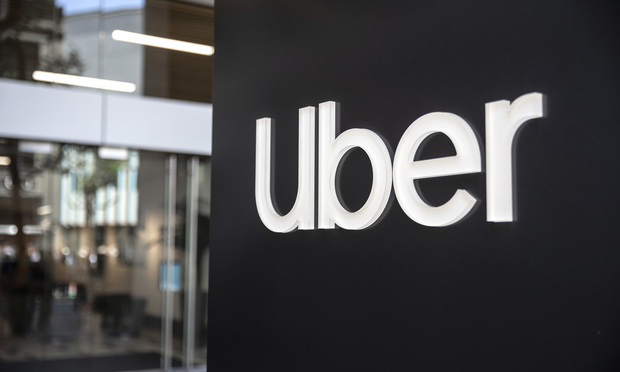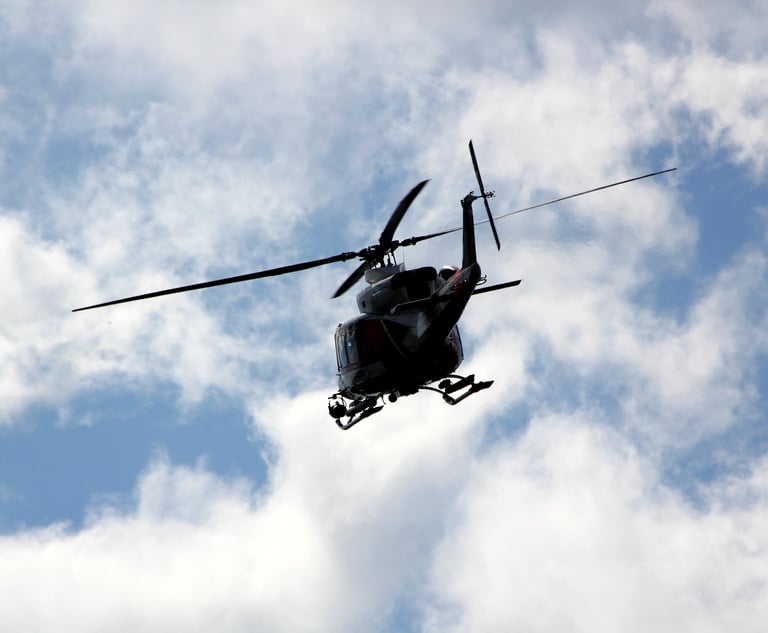Weighing Uber Driver's Status, Pa. Justices Eye Unemployment Benefits in Gig Economy
The case presents the justices with their first opportunity to evaluate whether the legal view of unemployment eligibility should evolve as "gig" jobs proliferate.
September 11, 2019 at 05:46 PM
4 minute read
 Uber headquarters in San Francisco. (Photo: Jason Doiy/ALM)
Uber headquarters in San Francisco. (Photo: Jason Doiy/ALM)
An attorney for the ride-sharing tech company Uber urged the Pennsylvania Supreme Court on Wednesday to focus its consideration of an unemployment eligibility case on the specific meaning of "self-employment," not an assessment of emerging labor economics.
The case—captioned Lowman v. Unemployment Compensation Board of Review—presents the justices with their first opportunity to evaluate whether the legal view of unemployment eligibility should evolve as "gig" jobs proliferate.
Littler Mendelson's Paul Lantis, arguing the case for Uber, told the high court that the case is "not a referendum on the gig economy, or on Mr. Lowman's status on the Uber app."
Justice Christine Donohue, however, suggested that could be a difficult task.
"I'm hard-pressed to understand how this [claimant's] relationship with Uber is not crucial," Donohue said.
The justices agreed to take up the case after an en banc Commonwealth Court panel ruled 7-1 in January 2018 that a former behavioral health specialist should be entitled to unemployment benefits, despite earning money as a driver for Uber after he lost his job. That decision reversed a holding from the Unemployment Compensation Board of Review.
The UCBR had determined that the driver, Donald Lowman, could not receive the benefits because driving for Uber constituted "self-employment," but Judge Mary Hannah Leavitt said the board's reasoning was flawed, and there was no indication that he planned to enter into an independent business venture as an Uber driver.
According to Leavitt, Lowman worked as a behavioral health specialist, but lost his job and applied for unemployment compensation benefits in June 2015. While he was awaiting a determination he entered into a software license and online service agreement with Uber's parent company, and began working as an Uber driver in July 2015.
About a month later the Unemployment Compensation Service Center determined that Lowman was not entitled to benefits, finding that his agreement with Uber made him ineligible.
Focusing on the degree of dependence between Lowman and Uber, the review board agreed that Lowman was ineligible for the benefits. The board found that he was not a subordinate in the company, and could refuse assignments if he wanted, or could provide similar services for other companies.
Leavitt, however, said that analysis "misse[d] the mark." A side job, Leavitt indicated, was a side job, even if entered into after loss of full-time work.
Justice Max Baer, during the argument session, told the attorneys he thought Leavitt's reasoning seemed correct.
"If he is self-employed, then so is the kid who cuts grass for $10 a week," Baer said. "The statute doesn't make sense, respectfully, if you're going to apply it as cutting grass is self-employment."
Janet Tarczy, who represented the Unemployment Compensation Review Board, discussed the statute and the two-pronged test outlined in the law to determine whether someone is self-employed. That test focuses on whether the claimant is free from control in his or her performance and whether the claimant is "engaged in an independently established trade, occupation or business."
Donohue, however, said she thought there were problems with the statute, including a failure to define "self-employment."
"We're going to have to look at the statute," Baer said. "But it has to make sense."
Lantis suggested the court focus its test on whether the claimant is dependent on the employer or is free to engage in other employment.
"Just because an individual has one client doesn't mean he can morph himself into an employee," Lantis said.
Julia Simon-Mishel of Philadelphia Legal Assistance, however, said that under any of the tests suggested, Lowman would not be considered self-employed. According to Simon-Mishel, in order to be self-employed, a person needs to own or exercise a substantial degree of control over the business.
Under Uber's argument, she said, a dog-walker could be considered a self-employed businessman, but that, she said goes against the intent of the law and could lead to an absurd result.
However, Simon-Mishel was in agreement with Uber that the court should not narrow in on aspects of the gig economy, but should instead focus the case on what tests courts in Pennsylvania should be applying.
"This court has the opportunity to provide some real clarity," she said.
This content has been archived. It is available through our partners, LexisNexis® and Bloomberg Law.
To view this content, please continue to their sites.
Not a Lexis Subscriber?
Subscribe Now
Not a Bloomberg Law Subscriber?
Subscribe Now
NOT FOR REPRINT
© 2025 ALM Global, LLC, All Rights Reserved. Request academic re-use from www.copyright.com. All other uses, submit a request to [email protected]. For more information visit Asset & Logo Licensing.
You Might Like
View All
Delivery Driver's Slip-and-Fall Suit Slides Forward Against Equipment Rental Company
4 minute read

Judge Leaves Statute of Limitations Question in Injury Crash Suit for a Jury
4 minute read
Federal Judge Rejects Lyft's 'Competitive Harm' Claims in Attempt to Seal Safety Procedures, Storage Information
4 minute readTrending Stories
- 1Cleary Nabs Public Company Advisory Practice Head From Orrick in San Francisco
- 2New York Environmental Legislation in 2024
- 3Cravath Hires Paul Weiss Antitrust Co-Chair
- 4Contract Technology Provider LegalOn Launches AI-powered Playbook Tool
- 5Court of Appeals Provides Comfort to Land Use Litigants Through the Relation Back Doctrine
Who Got The Work
J. Brugh Lower of Gibbons has entered an appearance for industrial equipment supplier Devco Corporation in a pending trademark infringement lawsuit. The suit, accusing the defendant of selling knock-off Graco products, was filed Dec. 18 in New Jersey District Court by Rivkin Radler on behalf of Graco Inc. and Graco Minnesota. The case, assigned to U.S. District Judge Zahid N. Quraishi, is 3:24-cv-11294, Graco Inc. et al v. Devco Corporation.
Who Got The Work
Rebecca Maller-Stein and Kent A. Yalowitz of Arnold & Porter Kaye Scholer have entered their appearances for Hanaco Venture Capital and its executives, Lior Prosor and David Frankel, in a pending securities lawsuit. The action, filed on Dec. 24 in New York Southern District Court by Zell, Aron & Co. on behalf of Goldeneye Advisors, accuses the defendants of negligently and fraudulently managing the plaintiff's $1 million investment. The case, assigned to U.S. District Judge Vernon S. Broderick, is 1:24-cv-09918, Goldeneye Advisors, LLC v. Hanaco Venture Capital, Ltd. et al.
Who Got The Work
Attorneys from A&O Shearman has stepped in as defense counsel for Toronto-Dominion Bank and other defendants in a pending securities class action. The suit, filed Dec. 11 in New York Southern District Court by Bleichmar Fonti & Auld, accuses the defendants of concealing the bank's 'pervasive' deficiencies in regards to its compliance with the Bank Secrecy Act and the quality of its anti-money laundering controls. The case, assigned to U.S. District Judge Arun Subramanian, is 1:24-cv-09445, Gonzalez v. The Toronto-Dominion Bank et al.
Who Got The Work
Crown Castle International, a Pennsylvania company providing shared communications infrastructure, has turned to Luke D. Wolf of Gordon Rees Scully Mansukhani to fend off a pending breach-of-contract lawsuit. The court action, filed Nov. 25 in Michigan Eastern District Court by Hooper Hathaway PC on behalf of The Town Residences LLC, accuses Crown Castle of failing to transfer approximately $30,000 in utility payments from T-Mobile in breach of a roof-top lease and assignment agreement. The case, assigned to U.S. District Judge Susan K. Declercq, is 2:24-cv-13131, The Town Residences LLC v. T-Mobile US, Inc. et al.
Who Got The Work
Wilfred P. Coronato and Daniel M. Schwartz of McCarter & English have stepped in as defense counsel to Electrolux Home Products Inc. in a pending product liability lawsuit. The court action, filed Nov. 26 in New York Eastern District Court by Poulos Lopiccolo PC and Nagel Rice LLP on behalf of David Stern, alleges that the defendant's refrigerators’ drawers and shelving repeatedly break and fall apart within months after purchase. The case, assigned to U.S. District Judge Joan M. Azrack, is 2:24-cv-08204, Stern v. Electrolux Home Products, Inc.
Featured Firms
Law Offices of Gary Martin Hays & Associates, P.C.
(470) 294-1674
Law Offices of Mark E. Salomone
(857) 444-6468
Smith & Hassler
(713) 739-1250





